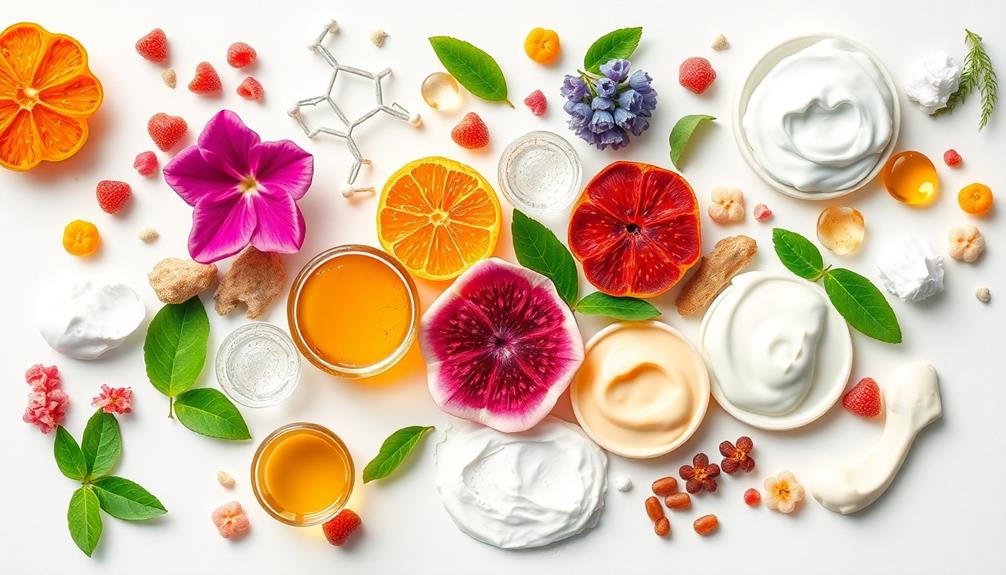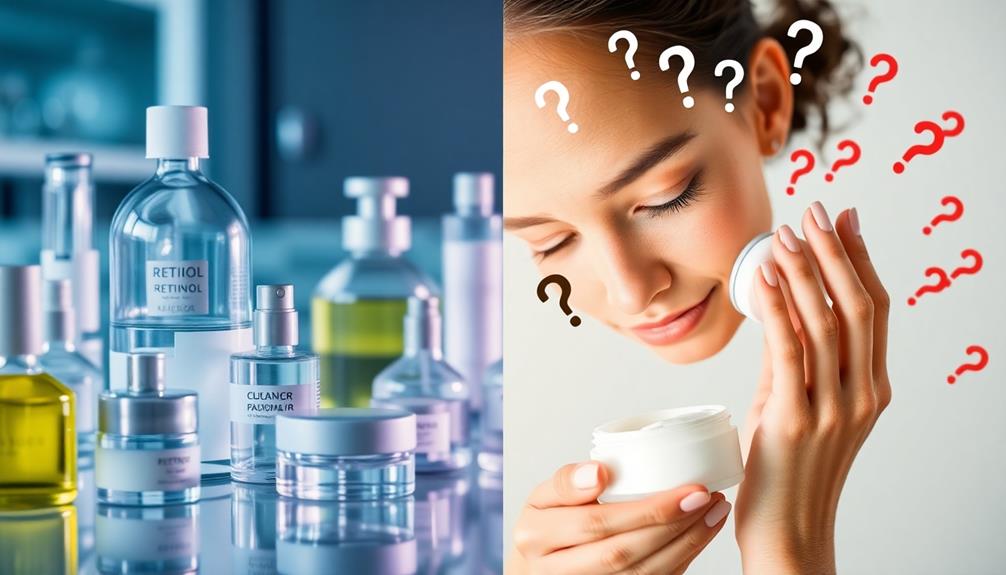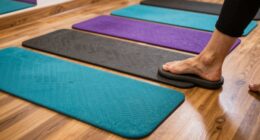Understanding popular skincare ingredients can help you choose the right products for your skin. Active ingredients like retinol and hyaluronic acid are proven to reduce wrinkles and boost hydration. Niacinamide minimizes pores, while vitamin C brightens and protects your skin from damage. AHAs encourage cell turnover, enhancing skin texture. However, results take time; expect noticeable changes within weeks, not days. Also, the effectiveness often hinges on how well these ingredients penetrate your skin. So, as you explore the benefits of these ingredients, you'll uncover more about how and why they work.
Key Takeaways
- Active ingredients like retinol and niacinamide have scientifically proven benefits for reducing wrinkles, minimizing pores, and enhancing skin texture.
- Hydrating ingredients such as hyaluronic acid can retain significant moisture, providing a plumping effect for the skin.
- Exfoliating agents like AHAs improve skin tone and texture by removing dead skin cells, promoting a brighter complexion.
- Vitamin C is effective in protecting against UV damage and improving skin brightness through collagen synthesis over a sustained period.
- Proper formulation and delivery systems enhance ingredient absorption and efficacy, ensuring measurable improvements in skin health.
Overview of Skincare Ingredients

Skincare ingredients play a crucial role in achieving healthy skin, and understanding them can make all the difference in your routine. Active ingredients, like retinol, alpha-hydroxy acids (AHAs), and Niacinamide, target specific skin concerns effectively.
Herbal remedies, such as chamomile and peppermint, are also gaining traction in skincare for their soothing properties and ability to calm irritated skin popular herbal teas.
Retinol, a derivative of vitamin A, is renowned for its ability to accelerate cell turnover and stimulate collagen production, making it essential for anti-aging formulations.
AHAs are chemical exfoliants that improve skin texture and tone by sloughing off dead skin cells. If you have dry skin, AHAs are your best bet; they help hydrate while enhancing your complexion.
On the other hand, if you're dealing with oily or acne-prone skin, consider using beta hydroxy acids (BHAs) for their deep-cleansing properties.
Niacinamide, or vitamin B3, is another powerhouse ingredient. It reduces inflammation, minimizes pores, and strengthens your skin barrier.
Finally, vitamin C, especially in its stable form as L-ascorbic acid, acts as a potent antioxidant. It protects against UV damage, brightens your skin, and boosts collagen production for a healthier-looking complexion.
Mechanisms of Action

Understanding the mechanisms of action behind various skincare ingredients can transform your approach to achieving healthy skin.
Alpha Hydroxy Acids (AHAs) work by loosening the bonds between dead skin cells, promoting exfoliation, and enhancing your skin's texture and radiance. For instance, glycolic acid, a popular AHA, not only exfoliates dead skin cells but also improves skin hydration and reduces the appearance of fine lines and wrinkles, making it a powerful tool for achieving a smoother complexion benefits of glycolic acid.
If you're battling acne, Beta Hydroxy Acids (BHAs) like salicylic acid can penetrate oil-laden pores, dissolving excess sebum and dead skin for improved clarity.
Retinol, a derivative of vitamin A, accelerates cell turnover and stimulates collagen synthesis, which helps reduce fine lines and hyperpigmentation over time.
Meanwhile, Niacinamide enhances your skin barrier function by increasing ceramide synthesis, allowing your skin to retain moisture better, reduce redness, and minimize pore appearance.
Lastly, Vitamin C, especially in its L-ascorbic acid form, acts as a powerful antioxidant that neutralizes free radicals, aids in collagen synthesis, and brightens your skin by inhibiting melanin production.
Key Benefits of Popular Ingredients

Often, the right skincare ingredients can make a significant difference in your routine and overall skin health. Take hyaluronic acid, for example. This powerhouse ingredient holds up to 1,000 times its weight in water, giving your skin a plump, hydrated look while minimizing fine lines.
If you're looking to improve texture and combat aging, retinol is your go-to. It speeds up cell turnover and stimulates collagen production, helping to reduce wrinkles and hyperpigmentation. Additionally, incorporating essential oils for skin health can enhance your skincare routine by providing natural benefits.
Vitamin C, especially in its stable form, protects your skin from UV damage while brightening your complexion and promoting collagen synthesis. For those with sensitive or acne-prone skin, consider using niacinamide. This versatile ingredient regulates oil production, minimizes pores, and boosts your skin barrier.
Lastly, alpha hydroxy acids (AHAs), like glycolic and lactic acid, exfoliate effectively by removing dead skin cells, enhancing your skin's texture and tone. By incorporating these popular ingredients into your skincare routine, you can experience noticeable improvements in hydration, brightness, and overall skin health.
Common Misconceptions

You might think that retinol delivers immediate results, but it actually takes time to see significant improvements in your skin.
Additionally, just because an ingredient is natural doesn't mean it's always the safer option; some natural products can trigger reactions just like synthetic ones.
For example, understanding the nuances of IRA inheritance rules can help in making informed decisions, just as being aware of skincare ingredients can enhance your routine.
Understanding these misconceptions can help you make better choices for your skincare routine.
Retinol Causes Immediate Results
Many people believe that retinol delivers immediate results, but this common misconception can lead to disappointment.
While retinol is celebrated for its ability to improve skin texture and promote collagen production, you won't see significant changes overnight. In fact, studies show that noticeable improvements typically take anywhere from 4 to 12 weeks of consistent use.
It's important to be aware that just like with symptoms of breast cancer, understanding the timeline for retinol's effectiveness can help manage expectations.
If you dive straight into a high-concentration retinol, you might experience irritation instead of the glowing skin you're hoping for. Initially, your skin may even feel drier or peel as it adjusts to the ingredient, emphasizing the importance of a gradual introduction.
Dermatologists recommend starting with a lower concentration, applying it a few times a week, to help your skin acclimate.
Natural Means Safer Options
The belief that natural ingredients are always safer can lead to misunderstandings in skincare. Many people think that just because something is labeled "natural," it's free from risks. However, both natural and synthetic ingredients can cause skin sensitization or allergic reactions.
| Ingredient Type | Potential Risks | Efficacy |
|---|---|---|
| Natural Ingredients | Allergies, irritation, sensitization | Varies; some can be potent allergens |
| Synthetic Ingredients | Can cause irritation but can be gentler | Often formulated for safety and efficacy |
| Misleading Claims | Exploitation of consumer trust | No guarantee of safety by labeling alone |
| Chemical Composition | Determines safety and effectiveness | Critical for understanding product impact |
It's essential to remember that the safety and efficacy of a product depend on its chemical composition and concentration, not merely its source. Some natural substances, like essential oils, can be highly concentrated and lead to adverse reactions, while certain synthetic ingredients can be gentler and more effective. Be cautious of misleading claims; always consider the science behind the ingredients you choose for your skincare routine.
Ingredient Safety and Side Effects

Steering through the world of skincare ingredients requires awareness of their safety and potential side effects. Understanding how various ingredients affect your skin is essential for achieving healthy results. Here are three key points to keep in mind:
1. Irritation Potential: Ingredients like Alpha-Hydroxy Acids (AHAs) and Retinol can cause redness and peeling, especially when you first introduce them to your routine.
Gradual integration helps minimize irritation. Additionally, products like Starface Acne Patches utilize hydrocolloid technology to reduce inflammation and promote healing, making them a gentle option for those with reactive skin.
2. Skin Sensitivity: Vitamin C can cause stinging, particularly for those with sensitive skin.
It's wise to start with lower concentrations and perform patch testing before full application.
3. Dermatologist Supervision: Hydroquinone is effective for hyperpigmentation but poses a risk of irritation.
Always use it under dermatologist supervision to monitor any adverse effects.
Evaluating Product Efficacy

When evaluating the efficacy of skincare products, you'll want to focus on how well active ingredients are absorbed by your skin.
Established brands like Patchology are known for their commitment to quality ingredients and formulations, which can enhance the overall effectiveness of their products.
Clinical studies provide solid evidence on what works, but the quality of the formulation also plays a vital role in delivering those benefits effectively.
Understanding these factors can help you choose products that truly make a difference in your skincare routine, especially when considering options like eye patches designed to hydrate.
Ingredient Absorption Mechanisms
Understanding ingredient absorption mechanisms is essential for evaluating product efficacy in skincare. The effectiveness of your skincare products hinges on how well active ingredients penetrate the skin barrier.
For instance, natural ingredients like herbal alternatives for botox-like effects can provide considerable benefits when absorbed effectively. Here are three key factors that influence this process:
- Molecular Size: Small molecules, like sodium hyaluronate, can penetrate deeper into the skin than larger ones, such as collagen.
- pH Levels: Formulations with a pH closer to your skin's natural range (4.5-5.5) help maintain the acid mantle, optimizing absorption while minimizing irritation.
- Delivery Systems: Advanced technologies, such as liposomes and nanotechnology, encapsulate active compounds, enhancing their penetration and targeted release.
Additionally, penetration enhancers like dimethyl sulfoxide (DMSO) can considerably boost absorption, making ingredients more effective.
However, certain actives, such as retinol and AHAs, promote cell turnover and require gradual introduction to avoid irritation.
Clinical Study Evidence
Evaluating the efficacy of skincare products requires a solid foundation built on clinical study evidence. Numerous clinical studies highlight the benefits of popular ingredients like vitamin C derivatives, alpha-hydroxy acids, and niacinamide.
For instance, research shows that L-ascorbic acid, a potent form of vitamin C, can improve skin brightness and reduce hyperpigmentation after 12 weeks of daily use by inhibiting melanin production. Additionally, the antioxidant properties of certain juices, such as cranberry juice, are beneficial for overall health, which may indirectly support skin health as well, though the direct impact on skincare is still being explored cranberry juice consumption.
Additionally, alpha-hydroxy acids (AHAs) have been proven effective for exfoliating the skin. Studies indicate that consistent use over 6 to 12 weeks can lead to improved skin texture and a reduction in fine lines, primarily due to increased cell turnover and enhanced product absorption.
Niacinamide is another powerhouse ingredient; clinical trials reveal it can minimize the appearance of enlarged pores and enhance skin texture after just 8 weeks of use by regulating sebum production and strengthening the skin barrier.
Formulation Quality Impact
The quality of a skincare product's formulation directly impacts its efficacy, making it vital to pay attention to how ingredients are combined. When evaluating products, consider the following factors:
1. Active Ingredients: The choice and concentration of active ingredients can greatly affect how well a product works. Ingredients like retinol and vitamin C need stabilizing agents to enhance their absorption and prevent degradation.
Additionally, just as raw food diets are associated with higher nutrient retention, the formulation of skincare products can also benefit from ensuring that active ingredients are preserved effectively.
2. Skin Barrier Function: A balanced pH between 4.5 and 5.5 is essential for maintaining skin barrier function. If the pH is off, it can compromise your skin's health, reducing the product's effectiveness.
Understanding the importance of maintaining a healthy skin barrier can be likened to the benefits of raw food diets for overall health, emphasizing the need for balance in both nutrition and skincare.
3. Delivery Systems and Bioavailability: Advanced delivery systems, such as liposomes or nanotechnology, enhance the bioavailability of ingredients, allowing them to penetrate deeper skin layers.
This can lead to improved results, as shown in clinical studies that demonstrate measurable skin improvements over time.
Trends in Skincare Science

How are current trends in skincare science reshaping your beauty routine? You're likely noticing a shift towards personalized skincare, where products are tailored to your unique skin needs. Thanks to advancements in genetic testing, brands can now create formulations that directly address your individual concerns, making your routine more effective than ever.
The clean beauty movement emphasizes safe, non-toxic ingredients, pushing brands to be transparent about their formulations. You can feel good knowing that what you apply to your skin isn't only effective but also safe.
Sustainable practices are also gaining ground; many brands are adopting eco-friendly sourcing and recyclable packaging, aligning your skincare choices with your values.
Moreover, technology integration plays an essential role in how you discover and manage your skincare. AI-driven product recommendations and app-based routines simplify the shopping experience and help you stay on track.
Innovative delivery systems like microneedling and nanotechnology are enhancing the absorption of active ingredients, making your skincare even more potent. With these trends in skincare science, your beauty routine is evolving, allowing you to achieve healthier skin in a more personalized, responsible way.
Recommendations for Skincare Routines

Creating an effective skincare routine can feel overwhelming, but it doesn't have to be. By following a few simple steps, you can achieve healthy, radiant skin while incorporating active ingredients that promote collagen production and hydration.
Here's a straightforward routine to get you started:
- Cleanser: Use a gentle cleanser to remove impurities without stripping your skin.
- Hydrating Serum: Apply a hydrating serum with hyaluronic acid to provide moisture and plump the skin.
- Moisturizer: Lock in hydration with a moisturizer that contains glycerin or ceramides, especially if you have dry or sensitive skin.
Remember, the order of application matters—apply products from thinnest to thickest. In the morning, consider using Vitamin C to protect against environmental damage, while retinol is best reserved for nighttime to avoid sunlight sensitivity.
Don't forget to exfoliate the skin regularly to enhance absorption of active ingredients.
Consistency is key; stick to your skincare routine daily for 4-6 weeks to see noticeable improvements. With these recommendations, you'll be well on your way to achieving your skincare goals.
Frequently Asked Questions
Is There Any Science Behind Skincare Products?
Yes, there's substantial science behind skincare products. Ingredients like retinoids, vitamin C, and hyaluronic acid have proven benefits for your skin, enhancing texture, hydration, and protection. Understanding their effects can help you make informed choices.
What Are the Most Effective Ingredients in Skincare?
You'll discover that hyaluronic acid's hydration magic, retinol's wrinkle-busting power, vitamin C's brightening charm, niacinamide's pore-perfecting skill, and AHAs' exfoliating wonders are skincare superheroes ready to transform your skin into a glowing masterpiece!
Does Skincare Actually Help Your Skin?
Absolutely, skincare can help your skin! When you consistently use quality products with proven ingredients, you'll notice improvements in texture, hydration, and overall appearance. Just remember to choose the right products for your skin type.
Do We Really Need Skincare Products?
You don't necessarily need skincare products, but they can greatly improve your skin's health. Regular use can prevent dryness and aging, enhance hydration, and protect against UV damage, leading to a healthier, more radiant complexion.
Conclusion
In a world where skincare's become a billion-dollar industry, it's essential to sift through the hype and know what really works. By understanding the science behind popular ingredients, you can make informed choices for your skin. Don't fall for fads—look for evidence-based benefits instead. Remember, just because something's trending doesn't mean it's effective. Tailor your routine to your skin's unique needs, and you'll find the glow that's timeless, like a classic vinyl record still spinning in the age of streaming.









